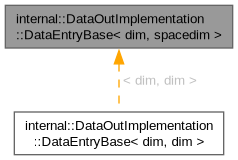 |
Reference documentation for deal.II version 9.6.0
|
 |
Reference documentation for deal.II version 9.6.0
|
#include <deal.II/numerics/data_out_dof_data.h>

Public Member Functions | |
| DataEntryBase (const DoFHandler< dim, spacedim > *dofs, const std::vector< std::string > &names, const std::vector< DataComponentInterpretation::DataComponentInterpretation > &data_component_interpretation) | |
| DataEntryBase (const DoFHandler< dim, spacedim > *dofs, const DataPostprocessor< spacedim > *data_postprocessor) | |
| virtual | ~DataEntryBase ()=default |
| virtual double | get_cell_data_value (const unsigned int cell_number, const ComponentExtractor extract_component) const =0 |
| virtual void | get_function_values (const FEValuesBase< dim, spacedim > &fe_patch_values, const ComponentExtractor extract_component, std::vector< double > &patch_values) const =0 |
| virtual void | get_function_values (const FEValuesBase< dim, spacedim > &fe_patch_values, const ComponentExtractor extract_component, std::vector<::Vector< double > > &patch_values_system) const =0 |
| virtual void | get_function_gradients (const FEValuesBase< dim, spacedim > &fe_patch_values, const ComponentExtractor extract_component, std::vector< Tensor< 1, spacedim > > &patch_gradients) const =0 |
| virtual void | get_function_gradients (const FEValuesBase< dim, spacedim > &fe_patch_values, const ComponentExtractor extract_component, std::vector< std::vector< Tensor< 1, spacedim > > > &patch_gradients_system) const =0 |
| virtual void | get_function_hessians (const FEValuesBase< dim, spacedim > &fe_patch_values, const ComponentExtractor extract_component, std::vector< Tensor< 2, spacedim > > &patch_hessians) const =0 |
| virtual void | get_function_hessians (const FEValuesBase< dim, spacedim > &fe_patch_values, const ComponentExtractor extract_component, std::vector< std::vector< Tensor< 2, spacedim > > > &patch_hessians_system) const =0 |
| virtual bool | is_complex_valued () const =0 |
| virtual void | clear ()=0 |
| virtual std::size_t | memory_consumption () const =0 |
Public Attributes | |
| SmartPointer< const DoFHandler< dim, spacedim > > | dof_handler |
| const std::vector< std::string > | names |
| const std::vector< DataComponentInterpretation::DataComponentInterpretation > | data_component_interpretation |
| SmartPointer< const ::DataPostprocessor< spacedim > > | postprocessor |
| unsigned int | n_output_variables |
For each vector that has been added through the add_data_vector() functions, we need to keep track of a pointer to it, and allow data extraction from it when we generate patches. Unfortunately, we need to do this for a number of different vector types. Fortunately, they all have the same interface. So the way we go is to have a base class that provides the functions to access the vector's information, and to have a derived template class that can be instantiated for each vector type. Since the vectors all have the same interface, this is no big problem, as they can all use the same general templatized code.
Definition at line 225 of file data_out_dof_data.h.
| internal::DataOutImplementation::DataEntryBase< dim, spacedim >::DataEntryBase | ( | const DoFHandler< dim, spacedim > * | dofs, |
| const std::vector< std::string > & | names, | ||
| const std::vector< DataComponentInterpretation::DataComponentInterpretation > & | data_component_interpretation ) |
Constructor. Give a list of names for the individual components of the vector and their interpretation as scalar or vector data. This constructor assumes that no postprocessor is going to be used.
| internal::DataOutImplementation::DataEntryBase< dim, spacedim >::DataEntryBase | ( | const DoFHandler< dim, spacedim > * | dofs, |
| const DataPostprocessor< spacedim > * | data_postprocessor ) |
Constructor when a data postprocessor is going to be used. In that case, the names and vector declarations are going to be acquired from the postprocessor.
|
virtualdefault |
Destructor made virtual.
|
pure virtual |
Assuming that the stored vector is a cell vector, extract the given element from it.
|
pure virtual |
Given a FEValuesBase object, extract the values on the present cell from the vector we actually store.
|
pure virtual |
Given a FEValuesBase object, extract the values on the present cell from the vector we actually store. This function does the same as the one above but for vector-valued finite elements.
|
pure virtual |
Given a FEValuesBase object, extract the gradients on the present cell from the vector we actually store.
|
pure virtual |
Given a FEValuesBase object, extract the gradients on the present cell from the vector we actually store. This function does the same as the one above but for vector-valued finite elements.
|
pure virtual |
Given a FEValuesBase object, extract the second derivatives on the present cell from the vector we actually store.
|
pure virtual |
Given a FEValuesBase object, extract the second derivatives on the present cell from the vector we actually store. This function does the same as the one above but for vector-valued finite elements.
|
pure virtual |
Return whether the data represented by (a derived class of) this object represents a complex-valued (as opposed to real-valued) information.
|
pure virtual |
Clear all references to the vectors.
|
pure virtual |
Determine an estimate for the memory consumption (in bytes) of this object.
| SmartPointer<const DoFHandler<dim, spacedim> > internal::DataOutImplementation::DataEntryBase< dim, spacedim >::dof_handler |
Pointer to the DoFHandler object that the vector is based on.
Definition at line 345 of file data_out_dof_data.h.
| const std::vector<std::string> internal::DataOutImplementation::DataEntryBase< dim, spacedim >::names |
Names of the components of this data vector.
Definition at line 350 of file data_out_dof_data.h.
| const std::vector< DataComponentInterpretation::DataComponentInterpretation> internal::DataOutImplementation::DataEntryBase< dim, spacedim >::data_component_interpretation |
A vector that for each of the n_output_variables variables of the current data set indicates whether they are scalar fields, parts of a vector-field, or any of the other supported kinds of data.
Definition at line 359 of file data_out_dof_data.h.
| SmartPointer<const ::DataPostprocessor<spacedim> > internal::DataOutImplementation::DataEntryBase< dim, spacedim >::postprocessor |
Pointer to a DataPostprocessing object which shall be applied to this data vector.
Definition at line 365 of file data_out_dof_data.h.
| unsigned int internal::DataOutImplementation::DataEntryBase< dim, spacedim >::n_output_variables |
Number of output variables this dataset provides (either number of components in vector valued function / data vector or number of computed quantities, if DataPostprocessor is applied). This variable is determined via and thus equivalent to names.size().
Definition at line 373 of file data_out_dof_data.h.